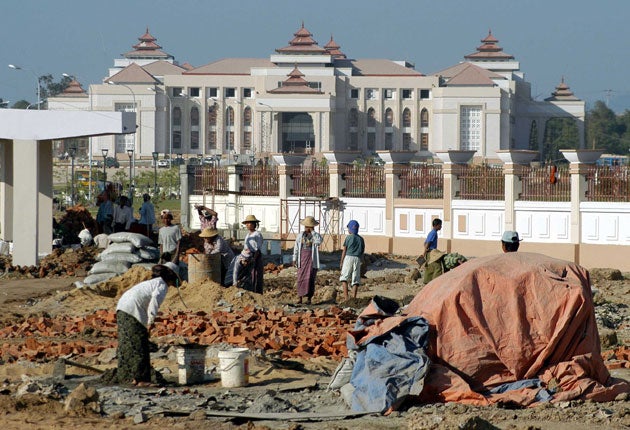Penguins and golf in Burma's hidden capital

Your support helps us to tell the story
From reproductive rights to climate change to Big Tech, The Independent is on the ground when the story is developing. Whether it's investigating the financials of Elon Musk's pro-Trump PAC or producing our latest documentary, 'The A Word', which shines a light on the American women fighting for reproductive rights, we know how important it is to parse out the facts from the messaging.
At such a critical moment in US history, we need reporters on the ground. Your donation allows us to keep sending journalists to speak to both sides of the story.
The Independent is trusted by Americans across the entire political spectrum. And unlike many other quality news outlets, we choose not to lock Americans out of our reporting and analysis with paywalls. We believe quality journalism should be available to everyone, paid for by those who can afford it.
Your support makes all the difference.A year ago this week, Burma saw its biggest uprising in decades when Buddhist monks and thousands of civilians poured onto the streets of Rangoon and Mandalay. But as the world watched, the targets of their fury were nowhere to be seen. The generals who rule Burma had relocated hundreds of miles to the north to a new purpose-built capital city designed to be impervious to protest or invasion.
Welcome to Naypyidaw, a bizarre, white-elephant place populated only by government employees forced to relocate. Building began after the personal astrologer of Than Shwe, the head of the notorious Burmese junta, prophesied unrest in 2005. The superstitious – and paranoid – regime selected a site in the remote badlands of central Burma and set about turning their mad vision into bricks and mortar.
Millions of Burmese are still reeling from Cyclone Nargis while rising food prices push many closer to starvation, but the military rulers are pumping money into their personal utopia. Sealed off from the rest of the world, an estimated £2.7bn from the ruby, teak and opium trades is giving Naypyidaw such luxuries as 24-hour lighting – most Burmese get electricity for a few hours a day – three golf courses and a zoo, complete with a climate-controlled penguin house.
Glimpses of the hidden city are rare. There are no international flights. Foreigners are banned. There is no mobile phone network. To get here, would-be visitors must take the battered road north of Rangoon. Suddenly the dirt track becomes a vast eight-lane highway stretching across the scrub land to the horizon. The highway is weirdly empty, used only by horses and carts and the occasional, screaming convoy of the junta's blacked-out SUVs.
The city itself is eerie, a jumble of new buildings spread over scrubland and linked by yet more wide roads. The government claims that a million people live here, but apart from construction labourers (widely assumed to be forcibly employed) and government workers, Naypyidaw is deserted. A few labourers in dirty sarongs walk past – they smile hesitantly and scurry away. Further on, we pass a group of women in the white shirts and green sarongs of the government uniform. They too avert their eyes.
Over everything hangs an unsettling quiet: where most Asian cities bustle, here there is silence. Along yet another empty road is a half-built shopping centre, with a huge glass front dusty from disuse. Nearby, a huge neoclassical building apparently modelled on Wall Street is being erected: it's the new bank. Other projects are further behind: "Mitsubishi Electronics Coming Soon!" declares a sign erected at a jaunty angle. Behind it is an empty field. Along another highway are hundreds of blocks of flats – there are more than 1,500 across the city. Many are clearly uninhabited. In an Orwellian touch, they are colour-coded according to the ministry whose employees they house: blue for Health, green for Agriculture and Irrigation. Next to them is a police station; outside a large board asks surreally, "May I help you?"
Than Shwe and his junta have locked themselves away in a fortress within a fortress, in a closely guarded secret quarter populated entirely by military leadership. No civilians – let alone foreigners – are allowed here. Reports say the area is a network of bunkers and luxury houses, from which the generals rarely venture, emerging downtown only to play golf or gamble in the specially built five-star hotels.
Even in nearby Pyinmana, a sleepy, poor town a few miles away, conversation is guarded. What do people here think of Naypyidaw? "They don't," says one local bitterly. "We just survive day to day." "Than Shwe is a king, he wants his own palace," shrugs another. "And although he is king, he is afraid of many things. He thinks that here he will be safe."
He may be right. A year on from the protests, there is little sign of more. There is no money for an armed uprising, and no organisation to run it. Hundreds are still in prison and many more are in exile.
Join our commenting forum
Join thought-provoking conversations, follow other Independent readers and see their replies
Comments